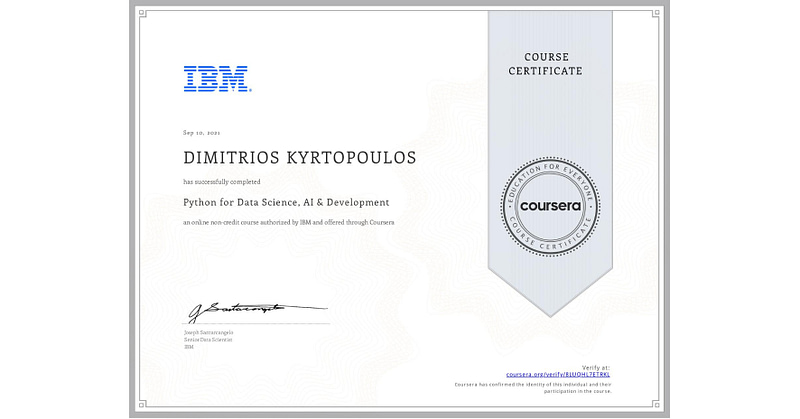IBM Python for Data Science, AI & Development
Instructor
About this Course
Kickstart your learning of Python for data science, as well as programming in general, with this beginner-friendly introduction to Python. Python is one of the world’s most popular programming languages, and there has never been greater demand for professionals with the ability to apply Python fundamentals to drive business solutions across industries.
This course will take you from zero to programming in Python in a matter of hours—no prior programming experience necessary! You will learn Python fundamentals, including data structures and data analysis, complete hands-on exercises throughout the course modules, and create a final project to demonstrate your new skills.
By the end of this course, you’ll feel comfortable creating basic programs, working with data, and solving real-world problems in Python. You’ll gain a strong foundation for more advanced learning in the field, and develop skills to help advance your career.
What you will learn
Explain Python Basics including Types, Expressions, and Variables.
Describe Data Structures in Python including Lists, Tuples, Dictionaries, Sets.
Apply Python programming using Branching, Loops, Functions, Objects & Classes.
Work with data in Python using Pandas and Numpy libraries.
Skills you will gain
Data Science
Python Programming
Data Analysis
Pandas
Numpy
Syllabus
Week 1: Python Basics
This module teaches the basics of Python and begins by exploring some of the different data types such as integers, real numbers, and strings. Continue with the module and learn how to use expressions in mathematical operations, store values in variables, and the many different ways to manipulate strings.
Week 2: Python Data Structures
This module begins a journey into Python data structures by explaining the use of lists and tuples and how they are able to store collections of data in a single variable. Next learn about dictionaries and how they function by storing data in pairs of keys and values, and end with Python sets to learn how this type of collection can appear in any order and will only contain unique elements.
Week 3: Python Programming Fundamentals
This module discusses Python fundamentals and begins with the concepts of conditions and branching. Continue through the module and learn how to implement loops to iterate over sequences, create functions to perform a specific task, perform exception handling to catch errors, and how classes are needed to create objects.
Week 4: Working with Data in Python
This module explains the basics of working with data in Python and begins the path with learning how to read and write files. Continue the module and uncover the best Python libraries that will aid in data manipulation and mathematical operations.
Week 5: APIs, and Data Collection
This module delves into the unique ways to collect data by the use of APIs and webscraping. It further explores data collection by explaining how to read and collect data when dealing with different file formats.

